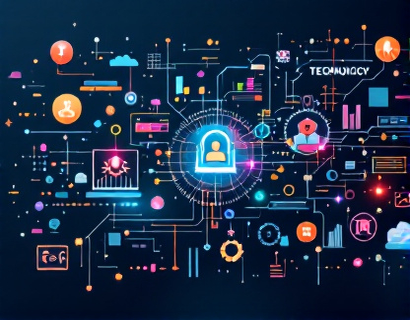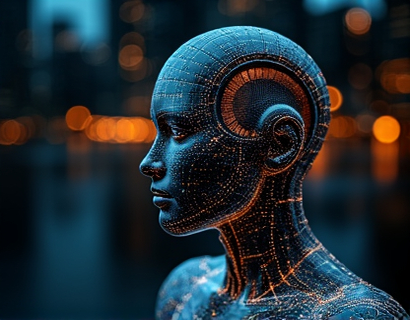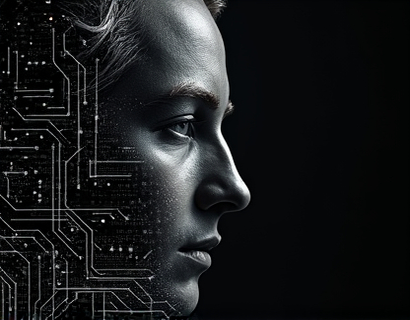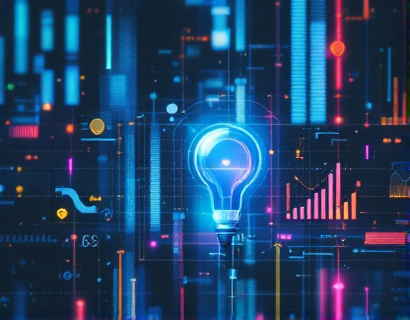Crypto and AI: Transforming Digital Experiences for the Blockchain Era
The intersection of cryptocurrency and artificial intelligence (AI) is ushering in a new era of digital transformation. This fusion is not just a technological curiosity but a powerful force reshaping how we interact with digital platforms, conduct business, and experience services online. For tech leaders and early adopters, understanding and leveraging this synergy is crucial to staying competitive and innovative in the rapidly evolving digital landscape.
The blockchain, the foundational technology behind cryptocurrencies, offers a decentralized, secure, and transparent way to conduct transactions and manage data. When combined with AI, which excels in processing vast amounts of data to uncover patterns, make predictions, and automate tasks, the potential for enhancing digital experiences becomes immense. This article delves into the transformative power of crypto and AI, providing insights and tools for tech leaders to navigate and thrive in this new era.
Enhancing Security with Crypto and AI
One of the most significant benefits of integrating crypto and AI is the enhancement of security measures. Traditional security protocols often rely on centralized systems, making them vulnerable to breaches and hacks. Blockchain's decentralized nature, combined with AI's advanced analytics, creates a robust defense mechanism.
AI can monitor blockchain networks in real-time, detecting anomalies and potential threats with high accuracy. Machine learning algorithms can adapt to new attack patterns, ensuring that security measures remain effective even as threats evolve. Smart contracts, self-executing contracts with the terms directly written into code, can be enhanced with AI to automatically respond to security breaches, minimizing the risk of human error and delay.
For businesses, this means a more secure environment for storing and transmitting sensitive data. Financial institutions, healthcare providers, and any organization handling confidential information can benefit from the increased security offered by crypto and AI. This not only protects against financial losses but also builds trust with customers and partners.
Optimizing User Experiences with AI-Driven Personalization
AI-driven personalization is revolutionizing how users interact with digital platforms. By analyzing user behavior, preferences, and historical data, AI can create tailored experiences that enhance engagement and satisfaction. When integrated with blockchain, this personalization can be both secure and transparent.
For instance, a user's digital identity can be managed on a blockchain, ensuring that personal data is owned and controlled by the user. AI algorithms can then use this data to provide personalized recommendations, content, and services without compromising privacy. This approach not only improves user experience but also complies with data protection regulations such as GDPR.
E-commerce platforms can leverage this combination to offer highly customized shopping experiences. AI can suggest products based on a user's browsing and purchase history, while blockchain ensures that transaction data is secure and tamper-proof. This dual approach can significantly reduce cart abandonment rates and increase customer loyalty.
Streamlining Operations with Smart Contracts and AI
Smart contracts, powered by blockchain, automate and enforce contractual obligations without the need for intermediaries. When combined with AI, these contracts can become even more efficient and intelligent. AI can analyze complex scenarios, predict outcomes, and optimize contract terms in real-time.
In supply chain management, for example, AI can track the movement of goods, predict delays, and optimize routes. Smart contracts can automatically execute payments and update contract terms based on these predictions, ensuring smooth and efficient operations. This reduces manual intervention, lowers costs, and minimizes errors.
For businesses, this means a more agile and responsive operational framework. Supply chain disruptions can be mitigated proactively, and resource allocation can be optimized based on real-time data. This not only enhances efficiency but also improves customer satisfaction by ensuring timely delivery and service.
Innovative Financial Services through Crypto and AI
The financial sector is one of the most impacted areas where crypto and AI converge. Decentralized finance (DeFi) platforms leverage blockchain to offer financial services without traditional intermediaries. AI enhances these platforms by providing advanced analytics, risk assessment, and automated trading solutions.
AI-driven algorithms can analyze market trends, predict price movements, and execute trades with high precision. This can democratize access to sophisticated investment strategies previously available only to institutional investors. For individual users, AI-powered financial advisors can provide personalized investment recommendations based on risk tolerance and financial goals.
Moreover, AI can help in detecting and preventing fraud in financial transactions. By analyzing patterns and identifying suspicious activities, AI can alert users and block fraudulent transactions in real-time. This level of security is crucial in building trust in decentralized financial systems.
Enhancing Customer Service with Chatbots and Virtual Assistants
Customer service is another area where the combination of crypto and AI can make a significant impact. Chatbots and virtual assistants powered by AI can provide 24/7 support, handling a wide range of queries and transactions. When integrated with blockchain, these tools can ensure secure and transparent interactions.
For example, a customer can use a blockchain-based digital identity to authenticate themselves, allowing the AI assistant to access and manage their account information securely. AI can understand natural language queries, provide instant responses, and even handle complex transactions such as transferring assets or accessing personalized financial advice.
This not only improves customer satisfaction by offering round-the-clock support but also reduces the workload on human customer service teams. Businesses can allocate resources more efficiently, focusing on more complex and high-value tasks while AI handles routine inquiries.
Challenges and Considerations
While the potential benefits are substantial, integrating crypto and AI also comes with challenges. Regulatory uncertainty remains a significant hurdle, as governments worldwide are still grappling with how to regulate these emerging technologies. Compliance with data protection laws and anti-money laundering (AML) regulations is crucial to avoid legal issues.
Technical complexity is another consideration. Developing and maintaining systems that combine blockchain and AI requires specialized skills and resources. Businesses need to invest in training their teams or partnering with experts to ensure successful implementation.
Additionally, there is the issue of scalability. While blockchain and AI can handle significant loads, ensuring that systems remain performant as user bases grow is essential. Solutions like layer 2 protocols for blockchain and distributed computing for AI can help address these scalability challenges.
Future Trends and Opportunities
The future of crypto and AI is bright, with numerous opportunities for innovation and growth. As technology advances, we can expect more seamless integration and new applications across various industries.
One exciting trend is the development of decentralized AI networks, where AI models are trained and run on a blockchain. This ensures that AI algorithms are transparent, auditable, and resistant to manipulation. Such networks can democratize access to AI, allowing smaller organizations and individuals to leverage advanced machine learning without the need for extensive resources.
Another area of growth is the integration of AI with other blockchain applications, such as non-fungible tokens (NFTs) and decentralized autonomous organizations (DAOs). AI can enhance the creation, management, and trading of NFTs, while DAOs can benefit from AI-driven decision-making and governance models.
For tech leaders, staying informed about these trends and actively exploring pilot projects can provide a competitive edge. By embracing the synergy between crypto and AI, organizations can not only improve their digital experiences but also contribute to the broader evolution of the blockchain ecosystem.
In conclusion, the fusion of cryptocurrency and AI is transforming digital experiences and business operations in profound ways. By enhancing security, personalizing user experiences, streamlining operations, innovating financial services, and improving customer service, this combination offers a wealth of opportunities. While challenges exist, the potential rewards make it a journey worth undertaking for those looking to thrive in the blockchain era.










































